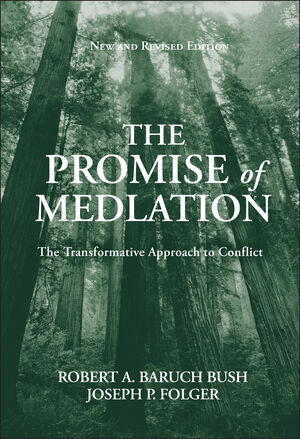The Promise of Mediation: The Transformative Approach to Conflict, Revised EditionISBN: 978-0-7879-7483-1
Hardcover
304 pages
October 2004, Jossey-Bass
 |
||||||
--James Alfini, president and dean, South Texas College of Law, Houston, Texas
“The Promise of Mediation provides a road map for
mediating workplace disputes in corporate America. Rather than
pushing parties to settle, transformative mediation provides a
process for employees to really work through their
differences¾so they can move forward with a positive outlook
and get back to business productively. I saw firsthand how
transformative mediation improved the workplace culture at the
United States Postal Service, and I have no doubt that its
potential for impact on corporate America is significant. A
must-read for human resource professionals, corporate counsel, and
all managers committed to improving the workplace through building
greater understanding between employees.”
--Cynthia J. Hallberlin, founder of REDRESS Mediation Program and
former ADR Counsel of the United States Postal Service
“Bush and Folger have once again provided the field with a
book that inspires and challenges us to reconnect with the reason
many of us became involved with mediation in the first place. In
the ten years since Bush and Folger wrote The Promise of
Mediation, they have gained experience and grown in clarity
regarding transformative mediation, and they skillfully share this
through the second edition. It is clear that transformative
mediation is here to stay and that it will continue to have a
profound and enriching impact on the field.”
--Sharon Press, director, Florida Dispute Resolution Center, and
former president, SPIDR
“In recent years, we have witnessed the erosion of the
core values of mediation in favor of service to the forces of
professionalism and legalism. The first edition of The Promise
of Mediation served as a stunning reminder of the potential of
mediation to empower individuals and communities in conflict. I
credit Bush and Folger with reminding the field of its core values.
Since the first edition, they have worked tirelessly to support the
development of a practice congruent with these values. I believe
that their efforts have produced a new model of mediation, one that
provides a unique role for the mediator¾especially the
community ‘citizen mediator.’ When we use the
transformative model, we’re offering a form of help that no
one else in society is offering to our fellow
citizens.”
--Thomas Wahlrab, member, board of directors, National Association
for Community Mediation, and coordinator, Dayton (Ohio) Mediation
Center
"Being human is what human beings do. Yet our approaches to
conflict analysis and resolution often dehumanize conflicts, by
marginalizing emotions and avoiding discussion of painful
histories. In this book, Bush and Folger help us re-imagine
mediation within a relational framework where emotions and painful
histories are essential features of the conflict transformation
process. This framework not only focuses on the connection between
people, but alos favors reflection on the parties' experiences, as
human being. And by implication, mediators, as human beings, are
encouraged to trust the parties in terms of their ability to move
through the problems. Conflict is thus reframed as a contribution
to the development of interaction, reather than a feature of life
that needs 'management.' While this book contributes to our
understanding of a model of mediation, it also humainzes conflict,
and in the process celebrates what it means to be a human
being."
--Sara Cobb, director, Institute for Conflict Analysis and
Resolution, George Mason University



